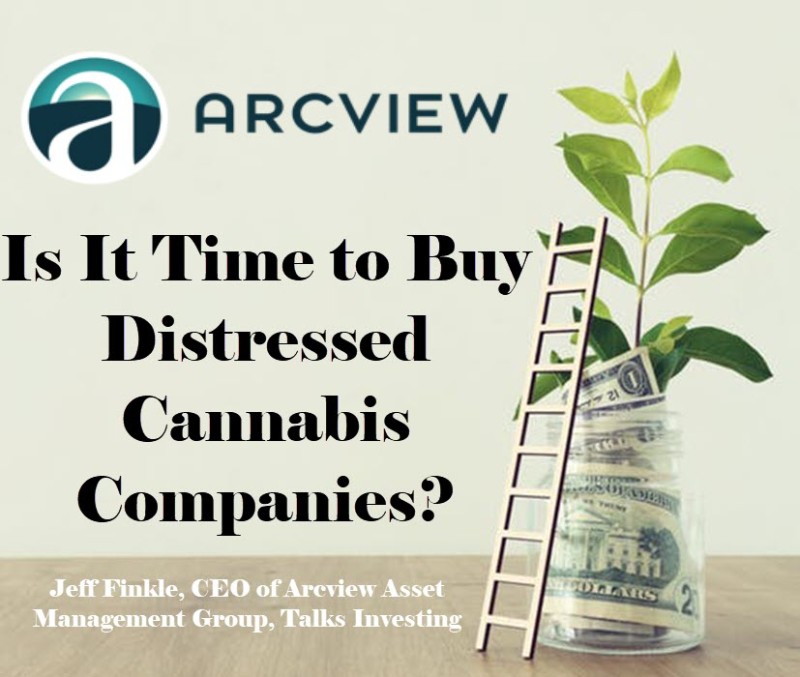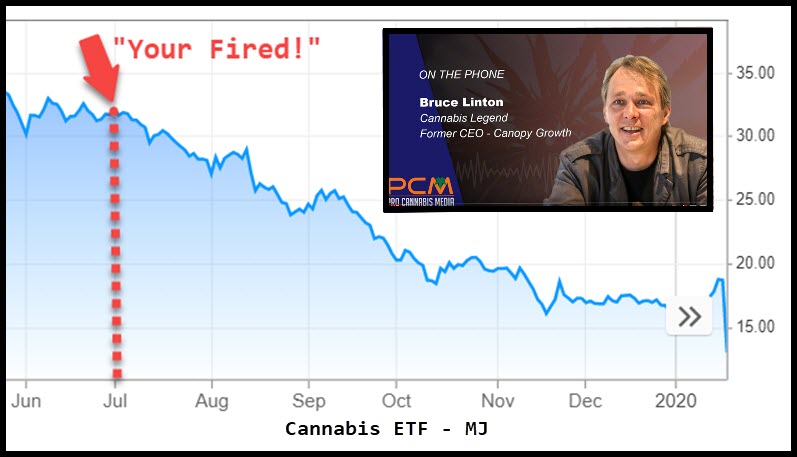Is It Time to Buy Distressed Cannabis Companies? - A Talk with Jeff Finkle, CEO of Arcview Asset Management Group
Jimmy Young of Pro Cannabis Media sat down with legendary cannabis investor and Arcview CEO, Jeff Finkle to talk the current state of the cannabis market. Jeffrey Finkle has been a venture and angel investor for 20 years. He is CEO of the Arcview Asset Management Group and co-founder of the Arcview Members Fund. He also serves in Executive roles for Angel Round Capital, an active Angel seed Fund in NYC. Jeff has been an advisor to tech and cannabis early stage companies for many years. Named as one of the “25 Angel Investors in New York you Need to Know,” Finkle publishes insights on his blog: www.finkabout.it. He is a frequent panelist, speaker and judge on venture investing and pitch competitions. Jeff was a partner at Odeon Capital Partners, an early-stage venture fund. Prior to Odeon, Jeff was an operating executive at CA, Inc and Cheyenne Software. Jeff also services as Chairman of the Board of WellLife Network, a not-for-profit offering residential, clinical and day programs in NYC.
Hi everyone welcome to a very special edition of In The Weeds with Jimmy Young. We are actually not on location anywhere, but we're here in our offices in Wellesley, Massachusetts and joining me on the phone is an old friend from New York City. His name is Jeff Finkle, and he's been named “one of the 25 Angel Investors in New York you need to know” so that's one of the reasons why I figured I'd hook up with Jeff Finkle again after all these years Jeff. Thank you so much for coming on today.
Jeff Finkle:
Thank you for having me Jimmy.
Jimmy:
So how did you ever get into the investment space of cannabis?
Jeff Finkle
Well, I spent the first eighteen years of my career as an operating executive in the software industry. I started a company into a series of acquisitions. I ended up at Cheyenne software which was a hyper-growth software company in the nineties. Then moved onto a computer associate when Computer Associates acquired Cheyenne. I stayed a couple of years had a great time, but I got recruited out to start a venture capital fund that focused on the tech industry in 1999. I ran that until 2009 and I was an angel investor after that but I was really looking for something different. I was really looking for a different sector to invest into in order to sort of apply my craft. I ran into an old friend that started an investment bank that focused on cannabis. I knew nothing about it in terms of an investment predicate and learned a lot from him and decided to jump in to create our first fund which is a member-managed venture fund focused on cannabis, which we've now since brought over to ArcView, but I think it was just a sequence of events as an investor in New York looking for something new and finding it.
Jimmy-
So tell me what’s going on with Arcview right now?
A lot of great things. So, Arcview historically has been the most prolific Angel Investing Network serving the Cannabis industry. Since 2010, I think over two hundred seventy million dollars have found its way into over two hundred companies through members of the Arcview network and that's really a lot of money. So Arcview would always sort of played the role of organizing and convening these investors and hosting events for these investors to meet companies and hear presentations from thought leaders. In June of 2019 Arcview raised some money with the idea is to turn on a series of revenue streams that they hadn't been involved in in the past. So they're keeping that sort of event and membership business, but they're also opening up a broker-dealer right? So they filed papers with Finra to open up a broker-dealer and to sort of be in the middle of those transactions. If they're bringing investors and entrepreneurs together then they should be in the middle of that transaction. Then separately I've entered into an agreement with ArcView to build a principal investing platform that we're calling Arcview Ventures. Arcview Ventures will invest money on behalf of LPS into the Cannabis industry. So Arcview really is now sort of bifurcating the business opportunity to three distinct areas to really turn on the revenue stream and leveraging the great brand that they've created.
Jimmy:
You mentioned the word member managed fund. Can you explain what that is?
Jeff:
It's a unique structure. It’s sort of the perfect sort of merger of a traditional Venture fund and a Loosely coupled Angel Network. So It’s a traditional fund with a limited package. They're investing the fund, right, and as a general partner that runs it and the limited partners passive. They get a report once a quarter and, they speak to the managers when they need to and it's very structured. When the general partner decides to invest in a company, they just decide on their own through their own internal investment committee and the limited partners have nothing to do with it.
In an Angel Network, it's just the opposite. Everybody's looking at companies, and they're making an independent decision on their own whether or not to invest in a company that they've seen. Well a member-managed fund brings both of those things together where we enable limited partners, who we call members, to be also part of the decision-making process on how the fund runs and in which companies the fund invests in.
Jimmy:
Got it. So I was at MJ Biz this past December in Las Vegas and one of the keynote speakers is a guy by the name of Mark Randolph, are you familiar with his story and who he is?
Jeff:
Yes I am.
Jimmy
Ok so you know he started Netflix and he admitted that it was difficult to be an angel investor because he liked everything he saw. Now how do you as an angel investor decide what is a good opportunity and what is not?
Jeff:
It's really hard and one of the things I've seen with Angel Investors is they tend to create a connection with the entrepreneur and often times will make the decision to invest when they feel like there's something missing in the entrepreneur that they can bring. That gives them that connection but I would argue that's maybe not a reason to invest. In fact, it might be a reason to walk in the other direction because ultimately you want to pick entrepreneurs that can do without that. It's really good to be able to understand the business and to be value-add but once you get that connection in your mind that says, “I think I know what they should be doing” that's really a bad sign and a predicate of a bad investment. That’s because you really want them to know what they’re doing. I've seen that mistake be made time and time again. One of the reasons why the member led model works. So that investor can now sit in a room, be part of the decision-making process with a cohort of other investors like them where they can share the due diligence exercises among them, leverage each other's business expertise and contacts to make a better investment decision. It's very hard to do this alone.
Jimmy
Gotcha, and I remember in one of our early talks a few months back you talked about the importance of the team that the investment goes not just with the entrepreneurs. But with the team that the entrepreneur put together how important is the team to an investor?
Jeff:
I think I now even think I have a contra point of view here. Most people will tell you team is everything, and team is very important, team is very, very important, but often times companies fail because their products solve some problem that people don't really have, or if they have it, it's not topical. I would almost argue that it's almost a luxury to fail because of execution or a poor team. You've got a first get over a fundamental hurdle that you're solving a problem that people have and that market forces there becomes a tailwind to sort of support the solution that this company is creating for that problem that will sort of drive this thing without friction. Most companies, don't get past that point. So while team is important, and don't let anyone tell your team is not important, I almost think it's a second-order magnitude problem, and the first order of magnitude problem is really understanding the timing of making sure that you're solving the topic of problem.
Jimmy
In 2020 is cannabis still a good investment for the investor? I mean a lot of things have happened now when you hear a lot of these companies like Medmen and High Times, some of the oldest brands in cannabis that companies are hurting or they're building too much debt.
Jeff:
So I think it's a very good time to look not withstanding. We went through, you know, a very difficult Q3 and Q4 the industry traded down tremendously. The publics got killed in the US mso's and the Canadian LPS got destroyed. These companies were run thinking the capital markets were going to be open forever and that they could continually raise money. There was sort of no guidance from the board that drove them to a path to profitability. Once the publics dried up and traded down, the later stage private equity in sympathy dried up and that affected things even down to the seed level. So we've been through that and in many ways while it's painful for many, particularly those that put money out in 2016, 2017, 2018 and we're hoping for an exit in nineteen, in a way, it's good for the industry.
Now things have sort of right priced, not all things, but many things have right priced valuations. They have kind of come down out of the stratosphere to something that seems to be more normalized and you know as we look forward in 2020, I think there are a number of things are going to be real drivers for continued growth. I can sort of talk about them if you'd like too but I think as you analyze them there's a number of things that can really drive growth as we go forward this year.
Jimmy:
For instance?
Jeff:
The first is exactly that some of these public companies are getting on a path to profitability. Now, we've actually had some pretty good reporting the last few weeks True Leaf. They announced $71 in revenue for Q3 with a positive EBITDA margin. Air Strategies, which is dominant in Nevada and Massachusetts, did thirty-two million dollars of adjusted EBITDA, just nine million dollars down in the fourth quarter, three point nine in cash flow. They did a tremendous job. Liberty Health Sciences, Planet 13, all of these companies are now starting to get it together to getting costs under control. They realize that they just can't go to the public markets and that's a positive sign. One would argue that might be the most positive sign to sort of bring stability to the industry. The second thing is success in the Midwest states. So, you know in January Michigan and Illinois just launched. They're doing tremendous sales. I think the two months sort of sales and Illinois was $39 million dollars really good. No big problems, Illinois particularly, being you know with Chicago being a home dense urban area really seeing those two programs come together is giving the industry a lot of confidence.
After that, I think there's a lot of support for the northeast states right? Governor Cuomo is making some positive comments about supporting the process. Remember last year New York missed like two votes (to legalize it) in the Senate. It came down to two votes. They couldn't agree on expungement. They couldn't agree on allocation of tax resources. But Cuomo is all over it this year and has already built it into the budget. Certainly if New York goes, we think New Jersey, Connecticut, Rhode Island, are not far behind which will bring sort of a “East Coast hug” to this industry. You know in California, you can buy illicit product at 50% lower costs than you can buy legal product in California because of the ridiculous tax structure. So I think that that's a very difficult thing for the industry, and the industry has not really rebounded from that but there's some positive comments from Governor Newsom to get that under control.
Canada as you know now launched cannabis 2.0. So they're allowing other products in than just flower. They're allowing edibles and beverages, that rollout seems to be going well. All of these things are very positive, notwithstanding that on the regulatory side, the Safe Banking Act is getting momentum in Congress, I think that will be very important if it passes. The FDA last week even came out with some positive comments about moving towards a structured program for the approval of CBD. All of these things or any two or three of these things will stabilize the industry and really drive growth into two thousand twenty and Twenty-One.
Jimmy:
So you mentioned the safe Banking Act. We know that it passed the House very nicely, at 321-103, but now it goes to the Senate. We all know that there is some …well, let's just say not a lot of action or governance going on in our government in Washington DC these days. Are you confident that the Senate may actually take this up before November?
Jeff:
You know, I'm not sure. Remember there are 420 banks that bank the industry right now, many of them are Community Banks, State Chartered Banks, Credit Unions, but there is banking support in this industry. So I think the Safe Banking act will sort of drive a lot of institutional debt providers to the industry, but I think the industry functions without it. So if this is a 2021 approval, I think that's fine. I mean the sooner the better, but I'm not sure that's going to be the thing that's going to change to accelerate this industry this year.
Jimmy:
The UN comes out talking about the possibility of de-scheduling cannabis internationally. This would be another positive development that hasn't happened yet, but I am talking about it already. I think they're following the World Health organization's lead on this, how much of a factor do you think that will be if that happens here in the United States?
Jeff:
I think it will matter certainly. It will give It thought to the US Senate and the US government sort of to drive more support for an initiative to come through. It might have some effect on the More Act which is, you know, just sort of sitting there. So I think it helps, I don't think it's I don't think the industry is going to turn on it, but I think it helps.
Jimmy:
The oldest brand in cannabis is High Times They just recently brought in Stormy Simon, a woman that I got to meet at MJ Biz and interview in December. There are some out there who think they brought her in to perhaps put her in a position to save, or to watch the company go down the drain. What is your opinion on High Times as an investment?
Jeff:
High Times just had a couple of bites of the Apple in the last two years and none of it's worked out really well. I'm going to say no comment. I haven't talked about brands if you'd like, Yeah, that's a media brand. It's not a product brand but it's a well-known brand in the space.
Jimmy:
Now they're going into dispensaries. So she actually is trying to make it into that product brand and take advantage. So what are your thoughts on brands (in cannabis)?
Jeff:
Okay. So 2019 was supposed to be the year of the brand, it was supposed to be the year of the beverage, and it certainly wasn't the year of the beverage. There are a lot of brands competing for shelf space. I guess as I'm an investor, you know a brand I guess, what I would say is, that it's very difficult for an artisan brand to emerge, where they don't control the supply chain, right? So they're not a producer of the biomass that goes into the product on one side or they don't own the shelf space down on the other side. If you're a large dispensary in California or Nevada or Colorado, you're controlling the shelf space, you're probably going to create your own brand.
So I think it's very difficult. I can tell you I see tons of business plans for brands that have a unique element. A team that comes from CPG (Consumer packaged goods) that seems it can get it done. But I don't see in many cases where the true advantage is, or where they're going to have a predicate, or an unfair advantage to win if they don't control one of those two things.
Jimmy:
There are a lot of multi-state operators out there, who have this seed to sale vertical that we keep see coming into new states. Where is the biggest margin? And is that the best way to kind of protect your investment if you get involved with one of these Multi State Operators?
Jeff:
So it's not on growing. There’s a lot of sort of margin compression around growing. You're going to see a lot in a world that contemplates repeal of prohibition. You're going to see a lot of grow happen in the southern states. You're going to see a lot in Mexico and Colombia. I mean they're able to produce at about $0.10 a gram for flower. I think the best most efficient producers in Canada are doing it about a dollar fifty a gram. You are also going to see biosynthesis where providers are essentially, through proprietary east cultures, developing CBD and THC at $0.10 a gram where it's consistent product brewed like in beer vats right out of yeast. So you don't have to go through grow cycles that are expensive and take time and there's so many variables into the weather in the conditions. So I think there's a lot of margin compression that I'm not sure that's the place to spend or to invest. I think it's going to be in retail and it's going to be in in the brand. It's the lack the ability to create a buying preference with a brand around a product. That said, you're still going to need the ability to get the shelf space with that brand. But if you're sort of talking about ripping apart the P & L, it's really going to be from the product with the brand to retail, that wholesale margin, and the retail to consumer. That's where most of the margin is.
Jimmy:
Speaking of wholesale. Do you see a day where we might actually be trading wholesale cannabis on the Commodities Market?
Jeff:
Sure, I can't tell you what day.
Jimmy:
So you can't look into your crystal ball and say it's going to be….
Jeff:
There's a lot of things to guess at but. I don't have the brain space to be guessing about that. But I think it will happen. Yeah, it's an agricultural crop. Right?
Jimmy:
Right.
Jeff:
It's going to be fairly large one. Yeah, it should act like that. You know in a world that contemplates, multi State Interstate Commerce and in repeal of prohibition, it will act like an agricultural crop.
Jimmy:
Yeah. I can't believe I thought I'd live to see this day in my home state that it's legal here for both medicinal use and for adult use recreational. Jeff, you've known me a long time. I never thought I'd see the Red Sox and Patriots win 10 championships in twenty years in my lifetime. And now we have cannabis legal as well when people come to you looking for money or pitching you. What's the biggest mistake that entrepreneurs make?
21:19
One mistake? Multiple mistakes. Well, I would tell you, it‘s not understanding the numbers. It's so easy with Excel today to build a financial model in a presentation that doesn't pass the smell test. Let me give you an example. I spent a lot of time in the software industry and I can't tell you how many software companies SAAS companies, software-as-a-service, would come to me and you look at their Excel model …. The first thing, you know about the excel model is whatever numbers that are there is a surely not the number that they're going to hit, in fact, its any number but that number. Nobody can predict, but if I'm looking at a SAAS company, and you look out the third and fourth year and you see that there's like an 80% EBITDA margin. There's no SAAS company in the world that ever delivered that first number. If you look at all the public comps, the best performers might have a 25 to 30% EBITDA margin and the truth is they just haven't figured out what the expenses going to be in the outcome. So that's a pet peeve of mine. It's not really being thoughtful about the financial model, even though the financial model is never going to be accurate, but it has to pass the smell test.
I would also say that companies make it confusing. It's full of jargon and they don't set proper context for investors. They don't unfold a story that starts with the problem that they're solving in a unique way. What’s the economic consequence of it not being solved? Then it’s their unique solution to that problem. Also, the market size, the team, the current metrics, the traction, the things that are going to be where success will turn on. It's a story that's not together that makes it easy to listen too.
Then the last thing I would tell you is another pet peeve. It’s when people are dishonest or inexperienced about their “Total Available Market” their TAM. It’s where they are looking at the market they're selling into the TAM rather than their own TAM. Meaning if they sold one hundred percent of the customers available to them at their average selling price how big would they be? That would be their Total Available Market, not the size of the cannabis industry that's expected to be fifty billion. That's not their TAM! That's the size of the market that they're selling into and you'd be surprised how many fairly experienced entrepreneurs don't really sort of correct for that in in their selling documents when they're talking to investors.
Jimmy:
When you mention that figure fifty billion for the size of the industry. Are you including the hemp side of things too?
Jeff:
No, that's cannabis only.
Jimmy:
Gotcha. I just want to make sure that we make that distinction because hemp to me seems like it has so many more uses than the Cannabis Sativa with THC side of things.
Jeff;
Well we don’t know! I mean, you know aside from the industrial side of hemp which you know that there's really not even a lot of investment capital going into it. There should be. Is CBD the Omega three of the two thousand and tens, you know? I get that there's medicinal principles that are more prolific and CBD then omega-3, but do we need it in our vinegar? Do we need it in our food and we need to have dinner parties with it, or is it enough and just buy a really good tincture or a gel cap or a cream when you know, when we're anxious or we have pain or other ailments? I just don't know. I just I don't know how big it will eventually be just on the CBD for the wellness benefit.
Jimmy:
Yeah, and I think we didn't even touch on CBN which is like a real deal.
That’s the real Anti-inflammatory component in that plant but even explaining the differences between those two is for a someone who did better in chemistry than I did because I did not take chemistry and I thought that science freaked me out.
Jeff:
Well, I remember you in high school. You were pretty good soccer player.
Jimmy
Oh man, that's great. And I did not pay him to say that ladies and gentlemen! I just want to say, you do know half the teammates I played with … Barry, Alan. Greg, you know exactly who they are and their names. I’ve got to ask you, it says here you want to talk about your favorite books? When the hell do you have time to read a book?
Jeff:
I didn't say when I read them, fair enough. I would say there are three great books. So one is, if you are in the Cannabis industry,”the Cannabis Manifesto” by Steve DeAngelo. I know he has been a frequent guest on your show. It’s a phenomenal book that helps you get around the history of the plant. The social mission about the plant, the economic mission about the plant. On the business side, the two books that I would recommend for entrepreneurs would be one, “The hard thing about hard things.” which is by Ben Horowitz and Andreessen Horowitz, about his life as an entrepreneur and the difficulties he had in running a business and exiting the business. And then the last one I would say is “Zero to One”, which is by Peter Thiel which really talks about Innovation and disruption a great book again for entrepreneurs as many others, but I would say those three, you know, the latter two on the entrepreneur side have been my two favorite books.
Jimmy:
I'm going to throw in a favorite book of mine because I met the author, actually the editor, her name was Ashley Picillo from Point Seven Consulting out of Colorado. It was called “Breaking the Grass Ceiling” and it was profiles of thirty women entrepreneurs in the Cannabis space and it's an easy read because it's like 30 short stories, but I am amazed at the impact that women have had in this cannabis industry already and we're still in its infancy.
Jeff:
Let me find that. Yeah, let me speak to that and we have seven portfolio companies now, three of them have a female CEO and in two of those cases a dual female founding team where the CEO and the COO as a fairly equal co-founders are both females. In the tech industry it took a long time to get there. There are now a lot of female focused funds serving tech. Not that many (funds) in cannabis, although I know of one or two that are trying to get off the ground, but I think there's been a greater sensibility towards diversity in the C-suite in the cannabis industry, than there has been in tech. I can tell you right now in our members fund. We have 44 members probably 20 of them are women. We are amending our charter to sort of work towards 1/3 of the companies that we invest in to have a diversity and inclusion component, either a female or a minority in the c-suite or a product that is fit-for-purpose for a female or minority buyer because we think that that's important priority there in our 7 we sure did that organically without having that it's a mandate but now that's becoming more of a mandate for us.
Jimmy:
Very cool. And Jeff you write up a blog on a regular basis. Why don’t you give yourself a little plug here.
Jeff:
Thank you. It's probably the only clever thing I've done in my life, which is not necessarily the blog itself, but the name. The name of the blog is Fink About It. Finkabout.it I'll give myself a hand. That's a little bit clever. I'm an infrequent blogger. Actually one of my resolutions for 2020 is plug more frequently off. I expect to have one coming out in about two weeks.
Jimmy:
Thank you Jeff, great to talk with you and learn more about the state of investing in the cannabis industry. Remember it’s a whole new world of weed out there, use it responsibly. For Jeff Finkle, thanks for listening and watching In The Weeds with Jimmy Young.
PRO CANNABIS MEDIA, WATCH THE LIVE SHOW HERE...
DID THE FIRING OF BRUCE LINTON CAUSE THE STOCK MARKET CRASH?








